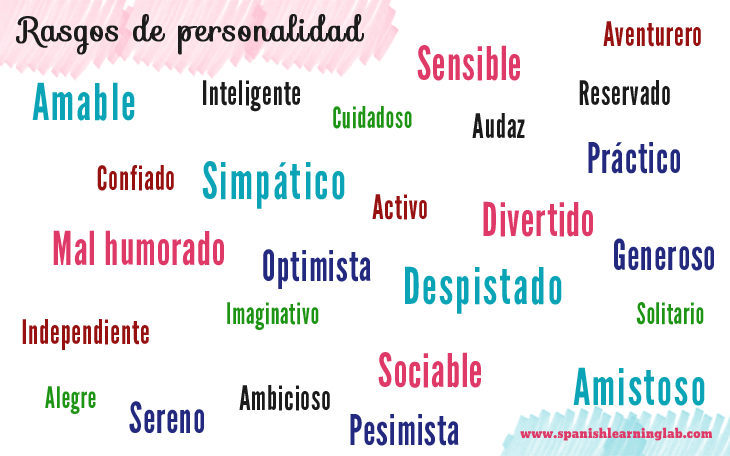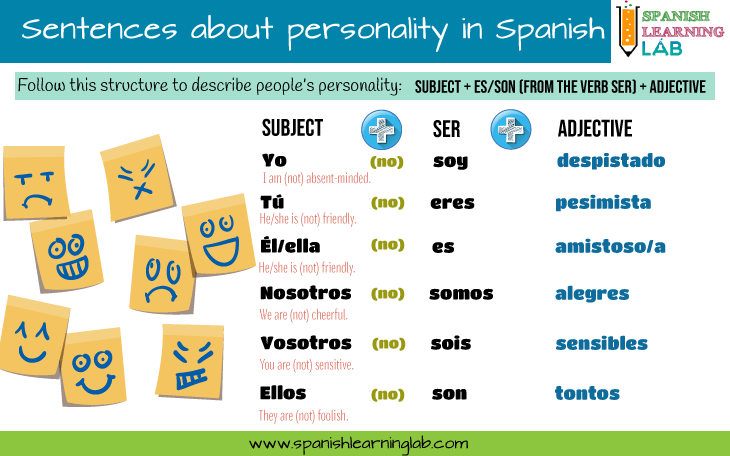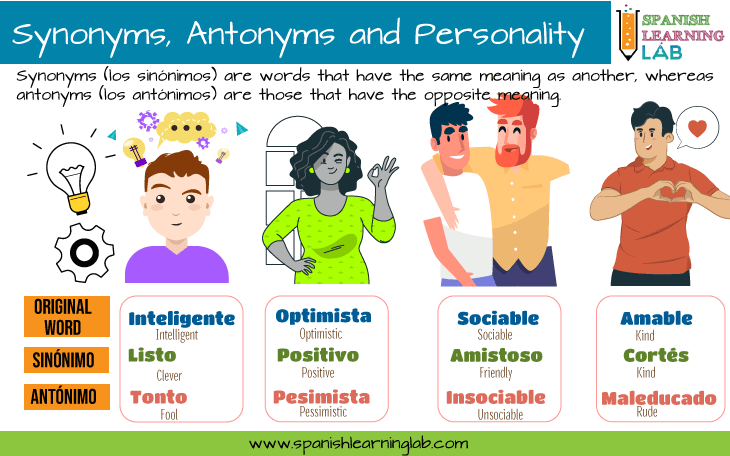¿Cómo describes tu personalidad? ¿Cómo eres? Those are two basic questions that people will ask to know more about your personality in Spanish. There are many words you can learn for personality traits – “rasgos de personalidad” – and that is why we will learn some of these adjectives in this lesson. For this purpose, we have prepared several examples of conversations, interactive quizzes and listening activities with key verbs like SER plus personality traits so that you also are able to describe your personality in Spanish. Let’s start…
A List of personality traits in Spanish – Los Rasgos de personalidad
First, words for personality traits in Spanish are actually adjectives, so sentences with these words must follow noun-adjective agreement rules. Notice that the phrase “RASGOS DE PERSONALIDAD” is used to refer to personality traits. The words in the picture below are probably the most common personality traits you will hear in real life interactions, but we encourage you to find others and use them to describe your personality in Spanish and other people’s character as well.

Before moving on, please take a couple of minutes to watch this resourceful video with a list of at least thirty different personality traits in Spanish. We will explain the basic structure of these types of sentences, and we will show you several examples of questions and statements on the topic that will help you better understand the conversations about character and personality that we will see later. You can activate the subtitles in English or Spanish if you want. Then, solve the vocabulary quiz for this topic below.
Talking about people’s personality in Spanish – La personalidad
Sentence structure to describe personality in Spanish
First, let’s discuss a little about the structure of sentences about personality in Spanish. It is very similar to the one used to describe people’s appearance. In order to ask “what kind of person are you?”, you could use the questions ¿Cómo eres (tú)?, ¿Cómo es tu personalidad? or even ¿Qué tipo de persona eres?. Sentences describing personality in Spanish usually follow the structure explained in this picture:

That being said, if you want to say something like “he is optimistic”, then you should say “Él es optimista” using ÉL as the subject of the sentence, ES as the main verb and OPTIMISTA as the personality trait. If you want to describe your personality in Spanish, then you should start with “Yo soy + adjetivos” or perhaps “(Yo) No soy + adjetivos”. In addition, you can say what kind of person you would like to be using “Me gustaría ser + adjetivo” (I would like to be…) or “Trataré de ser + adjetivo” (I will try to be…). See all of this in use in the sample conversation below:
- Cintia: Estaba pensando ahorita sobre nuestra personalidad ¿Cómo describes tu personalidad?
- Roberto: Esa es una buena pregunta… No sé, yo diría que soy optimista, independiente, práctico, activo y alegre
- Cintia: Si, yo creo que eres todo eso, pero tú también eres algo despistado.
- Roberto: Es cierto. A veces soy despistado, así que trataré de ser más cuidadoso como tú.
Synonyms and antonyms in Spanish – Los sinónimos y los antónimos
When someone asks you “¿Cómo eres?”, they could be asking about your physical appearance as well. Most of the time the question will be about your personality though. A nice way to begin is with “Creo que soy…” (I think that…) or “Me parece que soy…” (I think I am) plus one or a list of personality traits in Spanish, e.g. “Creo que soy honesto, amable, servicial…”. If you want to know the other person’s opinion, then you should ask “¿Qué opinas tú?“.

Spanish adjectives usually have one or several antonyms and synonyms, “Sinónimos y Antónimos”. LOS SINÓNIMOS are words that mean the same or almost the same such as INTELIGENTE and LISTO (smart), whereas LOS ANTÓNIMOS are words that mean the opposite like OPTIMISTA and PESIMISTA. Synonyms and antonyms are very easy to identify in the vocabulary for personality traits in Spanish. When learning a new language, creating associations among words makes it easier to remember the new vocabulary.
- Cintia: ¿Cómo eres?
- Roberto: ¿Cómo soy? Bien ¿Te refieres a mi apariencia física o a mi personalidad?
- Cintia: A tu personalidad
- Roberto: Vaya, creo que soy reservado y muy sereno la mayoría del tiempo. Soy sociable cuando debo serlo e inteligente también. ¿Qué opinas tú?
- Cintia: Pues sí, me parece que eres una persona ambiciosa y amistosa también, aunque algunas veces eres pesimista.
- Roberto: Tienes razón. Creo que debo ser más confiado y optimista en las cosas que hago.
Interactive quiz: Adjectives for personality, positive or negative?
Read each of the sentences using 30 personality traits in Spanish and classify them as positive or negative.
Activities that people like and their personalities in Spanish
Oftentimes, you can relate certain personality traits to the activities that people normally like or dislike to do. For instance, if someone says “Me gusta escalar montañas” (I like to climb mountains…), then you could infer that he is “aventurero”. Last, the verb SENTIR (to feel) might be useful to talk about personality in Spanish in phrases like “Siento que soy…“. Listen to the last sample conversation using all the things we have explained so far.
- Roberto: Sabes, me gustaría saber más sobre tu personalidad, ¿Cómo eres?, o ¿Cómo sientes que eres?
- Cintia: Qué te digo… bien, yo soy una chica generosa, aventurera y audaz. Me gustan los retos y me gusta compartir con otras personas. Soy muy imaginativa y creativa. Me encanta crear cosas nuevas y jugar con la imaginación. Hay días en los que siento que soy mal humorada…
- Roberto: Bueno, yo estoy de acuerdo con todo, principalmente con lo de malhumorada. Al final, todos somos una combinación de rasgos de personalidad, de optimista a pesimista, de simpático a odioso, pero eso es lo que nos hace interesantes.
Listening Activity No. 1: Describing your personality in Spanish – ¿Cómo eres?
Key expressions in the conversation:
- En buen sentido means “In a good sense”
- Sin ofender means “No offense”
- De ahora en adelante means “From now on”
Listening Activity No. 2: My personality in Spanish – Mi personalidad
We got to the end of this lesson. We hope that you found the examples that we presented very useful and that you can use this knowledge as a basis to describe your own personality in Spanish naturally and fluently. See you soon!
Related Spanish Worksheets:
- Personality Adjectives in Spanish – PDF Worksheet
- Pastimes, Likes & Dislikes in Spanish – PDF Worksheet
- Talking about Personality in Spanish – PDF Worksheet
- Physical Appearance in Spanish – Basic dialogues in PDF
- Likes and Preferences in Spanish – Conversation cards

Hola!